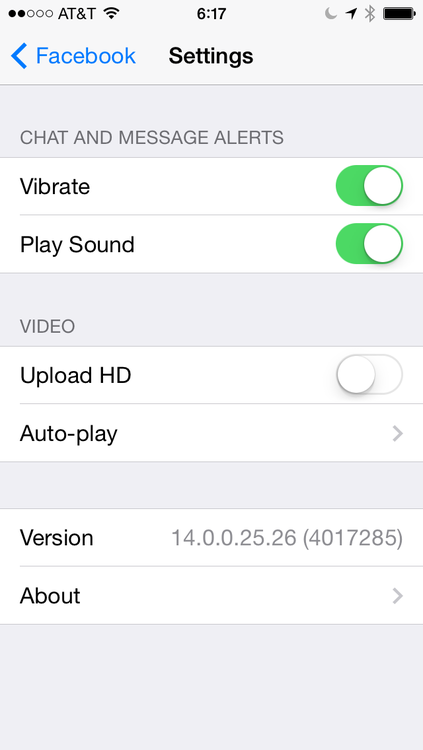A couple of photos from around London.
Blog Posts
If you are on a limited data plan you should turn off Facebook Auto-play to help preserve your data. There have been a few stories this week about it causing huge data bills.
Here is how to do so in iOS:
Click the Settings Icon.
Find the Facebook Settings.
Click Settings.

Click Auto-Play.

Choose Off (Or WiFi Only).

On Android you will find the auto-play settings within the Facebook app itself. Tap the menu button and then choose settings.
My son came home from his first full week of Kindergarten this week and had a list “learning targets” that lined up amazingly well with what we should be doing as security professionals.
I can use pictures to predict story content.
Being able to understand what is going on if we only have half the information is an invaluable skill for security professionals.
I can listen and follow directions.
Do you folllow your companies own security policies or have you exempted yourself from them because you are special?
I can use an appropriate voice level.
Have you mastered when a security incident a real emergency and is worth yelling about and when it is OK to wait to talk about it?
I can say the name of my classmates.
Can you name 90% of the people who work in your building (or for your company)?
I can have fun while learning.
Is your job still fun?

This morning I read “An Honest Message from Your IT Guy” and was kind of amused and disappointed and thought I should pen “An Honest Message from Your Security Guy” as a rebuttal.
I am here to help.
Seriously. I know the average IT guy can come across as a jerk but I work really hard to be a nice guy. If it wasn’t for you I would be selling insurance to over the road exotic animal movers.
Please don’t lie to me.
To paraphrase Jay-Z “"Men lie, women lie, logs don’t.“
While you swear you never visit "OfficeSupplies.XXX” we log all the traffic that leaves the network and I know for a fact you have a thing for swing line heavy duty staplers. It is cool… I am not here to judge but when your PC gets a virus and I have to come fix it and you have deleted your browsing history and tell me you were reading up on ancient roman birthday cakes it makes my job a little harder.
No. I don’t trust you.
I have done this job for over 10 years and I don’t think anyone has actually ever told me the truth when I asked what they were doing when their PC was infected.
No. I don’t trust you.
You cannot be a local admin on your PC. Doing so puts us both at a risk we don’t need. I don’t even have admin rights on my PC.
No. I don’t trust the IT guys.
Don’t feel bad. I really don’t trust the IT guys. 50% of my job is to “Watch the Watchers” and they try to get away with more stuff than you do.
Yes, I think those password requirements are ridiculous, too.
Our password policy should be much stronger because when (not if) our passwords get hacked I prefer it to take more processing power than your average 7th grader has available to crack them.
I am here to help.
Above all my job is to help you do your job securely. If you have a question or a problem I am here to help you.
Over the last couple of days I have seen a bunch of people post a link to this blog post about how the new Facebook Messenger “crosses the line” when it comes to the permissions it asks for.
Yes, the Facebook Messenger app requests these permissions:
- Change the state of network connectivity
- Call phone numbers and send SMS messages
- Record audio, and take pictures and videos, at any time
- Read your phone’s call log, including info about incoming and outgoing calls
- Read your contact data, including who you call and email and how often
- Read personal profile information stored on your device
- Access the phone features of the device, like your phone number and device ID
- Get a list of accounts known by the phone, or other apps you use.
There are plenty of legitimate reasons for requesting these permissions. Messenger needs access to your camera so that you can take and send pictures. It needs to access your microphone so that you can use the app to make free phone calls. Etc.
These kinds of sweeping permissions are also extremely common in Android because of the “open” nature of the OS. Even the most vanilla apps collect extraordinary amounts of personal data. Most weather apps keep a detailed GPS log of everywhere you have been in order to display the local weather (law enforcement agents really like this feature).
My advice to you is dont freak out and delete Facebook messenger and to audit the rights on your Android using a tool similar to Permission Explorer removing rights that you think “crosses the line”.
If you are still worried about it you should buy an iPhone. The iPhone security is much more locked down than Android.
If you do your grocery shopping at WalMart like I do you will want to start using the Walmart Savings Catcher program.
It is extremely easy to use:

On my first time using it I saved $2.35. I am guessing I will save close to about $150 a year using this program that I normally wouldn’t have.

For the last year my doctors have been worried about my moderately high blood pressure. A few weeks ago after a bad migraine attack and a huge spike in my blood pressure my doctor decided to put me on blood pressure medicine to lower it.
I have made these handy charts of my average energy level before and after I started taking the blood pressure medicine.


The good news is my blood pressure is in a normal range and I am not going to have a stroke. The bad news is I feel like 70 year old man and am ready for bed about 8.
I wonder if this is what normal people feel like all the time?
About once a month I will get a call from someone who is upset because their account was hacked and wants to know what they can do to stop it from happening in the future. The truth is enabling two factor authentication (2FA) is one of the best things you can do to make sure your accounts don’t get hacked.
Here is a list of popular services where you should enable 2FA:
- Google/Gmail: Google’s two-factor authentication sends you a 6-digit code via text message when you attempt to log in from a new machine, though it also works with the Google Authenticator app for Android, iOS, and BlackBerry. You can save each machine for 30 days. You can enable it here.
- Facebook: Facebook’s two-factor authentication, called “Login Approvals,” sends you a 6-digit code via text message when you attempt to log in from a new machine. It also works with apps like Google Authenticator for Android, iOS, and BlackBerry, as well as the “Code Generator” feature of the Facebook app. You can also authorize a new machine from Facebook.com on a saved machine if you don’t have your phone handy. You can enable it here,
- Apple: Apple’s two-factor authentication sends you a 4-digit code via text message or Find My iPhone notifications when you attempt to log in from a new machine. You can enable it here.
- Twitter: Twitter’s two-factor authentication sends you a 6-digit code via text message when you attempt to log in from a new machine. You can enable it here,
- Dropbox: Dropbox’s two-factor authentication sends you a 6-digit code via text message when you attempt to log in from a new machine, though it also works with Google Authenticator and a few other similar authentication apps. You can enable it here.
- PayPal: PayPal’s two-factor authentication sends you a 6-digit code via text message when you attempt to log in from a new machine. You can read more about it and enable it here.
- Microsoft Accounts: Microsoft’s two-factor authentication sends you a 7-digit code via text message or email when you attempt to log in from a new machine, though it also works with a number of authenticator apps. You can enable it here.
- Yahoo! Mail: Yahoo’s two-factor authentication sends you a 6-digit code via text message when you attempt to log in from a new machine. You can enable it here.
- LinkedIn: LinkedIn’s two-factor authentication sends you a 6-digit code via text message when you attempt to log in from a new machine. You can enable it here.
You should also check out twofactorauth.org to see if other accounts you use have the ability.
I have a Samsung S3 that decided it wouldn’t boot on Wednesday. After talking to the very helpful people at Samsung they decided that they can replace my phone for me but I need to send them my broken phone.
Awesome!
But…
All my data is on my phone. All my email. All my passwords. All my texts. All my pictures. I have backups and I have a password on my phone but I still have to send my phone back to a company who could access it if they wanted to.
So what is a security professional to do? Normally I would just wipe my phone and send it in but since that isn’t an option I am stuck with either keeping a $400 brick or possibly exposing my data to Samsung.
I guess I have a $400 brick.